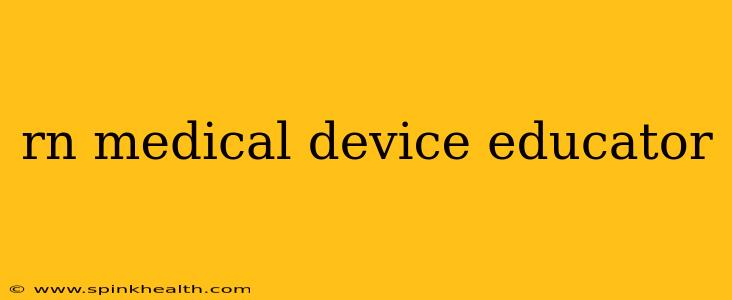The Heart of the Matter: A Day in the Life of an RN Medical Device Educator
The sterile scent of antiseptic, the rhythmic beep of monitors, the hushed urgency of a busy hospital ward – these are the familiar soundscapes of a Registered Nurse (RN). But for a select few, the path diverges, leading into the fascinating and vital world of medical device education. This isn't just about teaching; it's about bridging the gap between cutting-edge technology and the hands that use it, ensuring patient safety and optimal treatment outcomes. Let's delve into the rewarding, yet demanding, role of an RN Medical Device Educator.
My journey began, like many RNs, at the bedside. Years spent navigating the complexities of patient care instilled in me a deep appreciation for the nuances of medical technology. It was during this time I noticed a recurring theme: the struggle some clinicians faced in fully utilizing the advanced devices at their disposal. This sparked an interest, a desire to empower my colleagues with the knowledge and skills needed to maximize the benefits of these life-saving tools.
The transition from bedside nurse to educator wasn't instantaneous. It required further education, meticulous training, and a commitment to continuous learning. The field is constantly evolving, with new devices and technologies emerging at a rapid pace. Staying ahead of the curve is paramount.
What Does an RN Medical Device Educator Do?
This isn't a role confined to the classroom. An RN Medical Device Educator's responsibilities are multifaceted and dynamic. We're not just instructors; we're mentors, problem-solvers, and patient advocates. Our days often involve:
- Developing and delivering educational programs: This encompasses creating curriculum, designing engaging training materials, and conducting workshops and in-services on a wide array of medical devices.
- Providing hands-on training: This is where the rubber meets the road. We work directly with clinicians, guiding them through the intricacies of operating specific devices, troubleshooting common issues, and ensuring competency.
- Creating and maintaining educational resources: Developing comprehensive manuals, interactive simulations, and online learning modules to support ongoing professional development.
- Staying current with the latest technology and regulations: The healthcare landscape is dynamic, and we must remain informed about advancements in medical devices and the regulatory frameworks governing their use.
- Assessing learner needs and adapting training accordingly: Tailoring our approach to ensure effective knowledge transfer and skill acquisition.
- Collaborating with other healthcare professionals: Working with engineers, clinicians, and administrators to optimize device utilization and patient care.
What Kind of Education and Certification Do I Need to Become an RN Medical Device Educator?
This is a question I frequently receive. The path to becoming an RN Medical Device Educator typically involves:
- A registered nursing license: This is the foundational requirement.
- Significant experience in a clinical setting: Hands-on experience with medical devices is crucial, allowing for a deeper understanding of their application and limitations.
- Advanced education or certifications: Many educators pursue additional qualifications, such as a master's degree in nursing education or certifications in specific medical device areas.
The specifics can vary depending on the employer and the type of devices being taught. Networking and seeking mentorship within the field are invaluable.
What Are the Challenges of Being an RN Medical Device Educator?
The role isn’t without its challenges. The rapid pace of technological advancements, the constant need for updating educational materials, and the diverse learning styles of healthcare professionals require adaptability and flexibility. Ensuring that training is engaging and effective can be demanding, requiring creativity and strong communication skills. Moreover, integrating new technology into already busy clinical workflows can present logistical hurdles.
What Are the Rewards of Being an RN Medical Device Educator?
Despite the challenges, the rewards are immense. Knowing that you've played a role in improving patient safety and enhancing the quality of care is profoundly fulfilling. The opportunity to mentor and empower colleagues, fostering a culture of continuous learning and professional development, is equally rewarding. Witnessing the growth and confidence of clinicians as they master new technologies is a constant source of satisfaction.
Is this career path right for me?
If you're a registered nurse with a passion for technology, a knack for teaching, and a desire to make a real difference in patient care, then the role of an RN Medical Device Educator could be the perfect fit. The path requires dedication and commitment, but the rewards are immeasurable. It's a chance to be at the forefront of medical innovation, empowering others to provide the highest quality of care. The heart of this profession beats with the rhythm of progress, ensuring that the latest technologies are utilized effectively, ultimately benefitting those who need it most.

